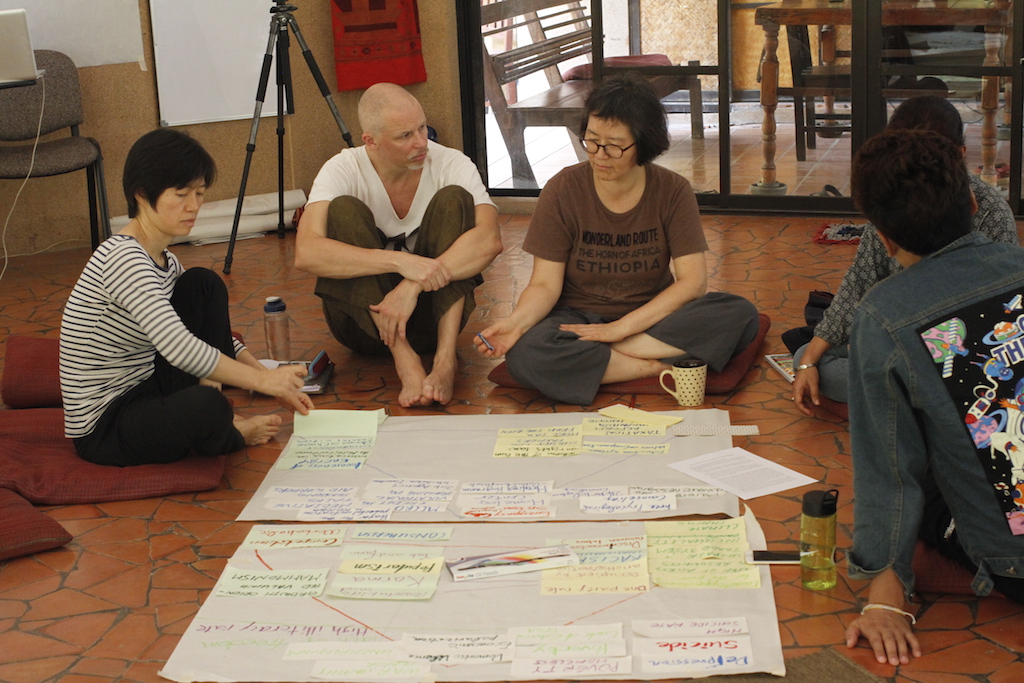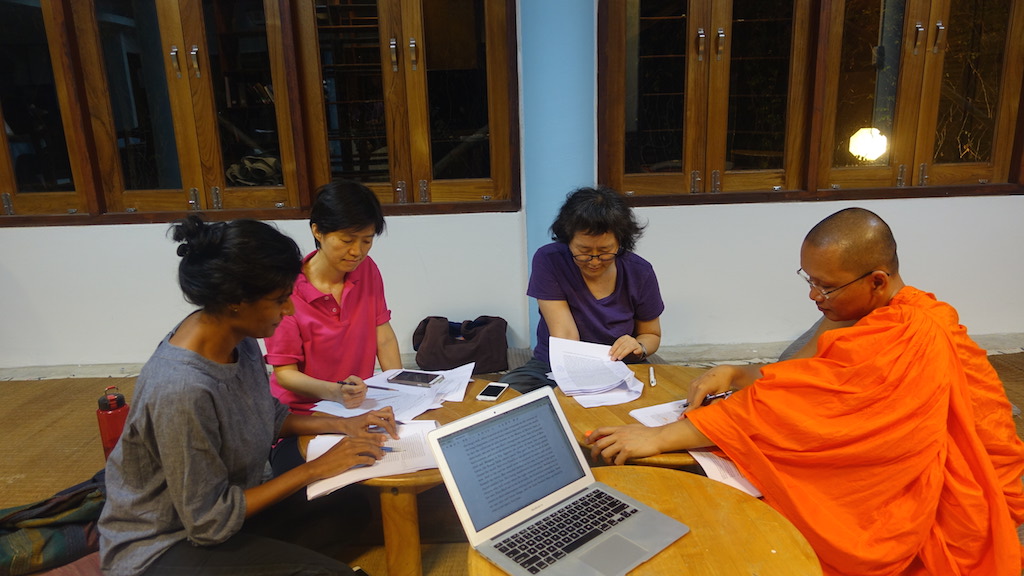MA in Socially Engaged Buddhism
One year program (3 terms)
Thailand, Taiwan, India
COURSE PENDING TILL FURTHER NOTICE

OVERVIEW
The MA in Socially Engaged Buddhism is a multi-sited program in Asia that seeks to integrate spiritual and social transformation, grounded in Buddhist traditions. Students learn from monastics, community activists, meditation teachers, professional academic scholars, group facilitators and each other. They learn through observation, reflection, textual study, lectures, interviews, group challenges, exposure trips, personal practice, and joint work on social action projects. Medium of instruction is English.
FEES
25,000 USD for tuition, living expenses, and in-program travel.
TERM DATES
- to be announced
HIGHLIGHTS
- Learn from a qualified, international panel of academic-practitioners.
- Meet and work with spiritual leaders, thinkers, organizers, activists and educators representing different Buddhist traditions.
- Gain a student-centered, accredited qualification with a high academic standard.
- A comprehensive curriculum that captures the complexity of contemporary social issues and offers mainstream and alternative approaches to understanding these.
- Study at different locations and learn from the history, culture and people at each location.
- Study with a small, dynamic group of future leaders who are equally committed to personal, spiritual, and societal transformation.

Who should apply
We especially welcome your application if:
- You are committed to developing a work practice that integrates spiritual and social transformation.
- You have engaged in social work or volunteer service.
- You are resilient, love travelling, and are passionate about intellectual and inner inquiry.
- You enjoy living, working and learning together with a small, diverse group of students.

Application Requirements
Applicants must have completed an undergraduate degree from a recognized institution. Applicants whose first language is not English will need to submit official English proficiency test scores from a recognized testing company. We accept a variety of standardized tests, the most common being TOEFL and IELTS.
The minimum scores required for full acceptance into the MA program are:
TOEFL (PBT) – 575
TOEFL (iBT) – 89
IELTS – 6.5
Pierson – 61
We especially welcome your application if:
- You are committed to developing a work practice that integrates spiritual and social transformation.
- You have engaged in social work or volunteer service.
- You are resilient, love travelling, and are passionate about intellectual and inner inquiry.
- You enjoy living, working and learning together with a small, diverse group of students.
All incusive fees (USD)
students in class
terms
Credits
CURRICULUM
Core Courses
- All students take 5 core courses to establish a common ground of knowledge & experience. (19 credits)
- Socially Engaged Buddhism – Histories, Practices, & the Work of Integration (6 credits)
- Personal & Interpersonal Disciplines for Healing, Transformation, & Well-Being (4 credits)
- Ways of Knowing & Interpreting – Science, Religion, Philosophy, & Shifting Paradigms (3 credits)
- Global Political Economy & Structural Violence (3 credits)
- Climate, Ecology, & Human Relationships with Nature (3 credits)
Students joining our program in August 2018 will also have a special opportunity to receive elective credit in the MA program for successfully completing the following course:
- Chulalongkorn University Right Livelihood Summer School
- For more information on the CURLS course, please contact:
https://wellbeingsummer.wordpress.com/ or
Kittikhun Pookhongkha at kittikhb@gmail.com
Elective Courses
- Students choose at least 4 courses amounting to a total of at least 9 credits. Elective courses will be offered in one of two formats: 1) as regular term-length courses, or 2) as focused workshops.
- Electives will reflect important thematic areas and the special resources and opportunities available at each of the four sites -Tea Ceremonies & Contemplation in Taiwan, for example. Students will help to choose the electives to be offered each term. (Each course 1-3 credits)
- Topics in Buddhist History, Philosophy, & Practice
- Environments, Food, Farming, & Well-Being
- Technology & Design for Social Change
- Histories of Social Movements, Nonviolence, & Peacebuilding
- Transformation & Peacebuilding through the Arts
- Practicum in Advocacy, Organizing, Social Entrepreneurship, & Contemplative Action
- Transformative Learning & Teaching
- Understanding & Empowerment – Gender, Race, Ethnicity, & Class.
- Language Study
ADDITIONAL REQUIREMENTS
Meditation Retreat
All students complete a meditation retreat of at least 7 days duration. In most cases the entire group will undergo a retreat together.
Internship or Thesis
During the summer semester, students complete an internship or a thesis under the guidance of a faculty advisor. The internships will generally be nine to ten weeks in duration. (12 credits)
Summer Seminar
The summer seminar gives students the opportunity to present the work they have completed over the summer. Students give a detailed oral presentation and submit a written report about their internship or thesis. (2 credits)

ACCREDITATION FOR THE MA IN SOCIALLY ENGAGED BUDDHISM
The INEB Institute is developing a curriculum hand-in-hand with the Arsom Silp Institute of the Arts
in Bangkok that will meet the requirements for full accreditation by the Thai Ministry of Education.
Arsom Silp Institute of the Arts is a small and innovative university that combines holistic approaches
to education with an emphasis on Buddhist principles and values.
ASSESSMENT
Faculty mentors use a variety of methods to assess student work, including written essays, presentations, journals, performances or other creative work, as well as examinations and one-on-one interviews where appropriate. Students participate through self-assessment and by helping determine the forms of assessment.


MOSAIC DESIGN
Many of the courses in the master’s program will be constructed using a mosaic design. Such courses will consist of a single consistent theme that unfolds in a variety of sites and through workshops, seminars, and other learning formats of varying durations. In some cases, the shorter learning opportunities will also be open to enrolment by the wider public. Mentors will work to create a cohesive student cohort, but one that is also opened up at times in this way to new students who bring fresh sources of companionship, thought, and experience.
